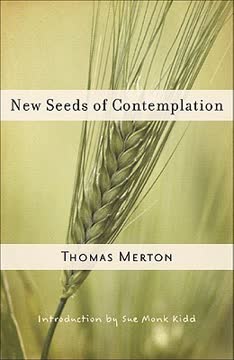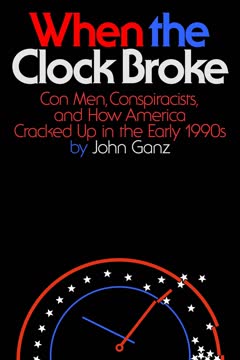Key Takeaways
1. Courage as existential self-affirmation in the face of nonbeing
Courage is the self-affirmation of being in spite of the fact of nonbeing.
Ontological foundation. Courage is not merely a virtue or an ethical concept, but an ontological reality deeply rooted in the structure of being itself. It represents the fundamental human capacity to affirm one's existence despite the constant threat of nonbeing.
Existential challenge. This self-affirmation is not a simple act of willpower, but a profound engagement with the very nature of existence. It requires facing the anxiety that arises from our awareness of our finite nature and the possibility of our own annihilation. Courage, in this sense, is the power to embrace life fully while acknowledging its inherent uncertainty and potential for loss.
2. The three types of anxiety: fate and death, emptiness and meaninglessness, guilt and condemnation
Nonbeing threatens man's ontic self-affirmation, relatively in terms of fate, absolutely in terms of death. It threatens man's spiritual self-affirmation, relatively in terms of emptiness, absolutely in terms of meaninglessness. It threatens man's moral self-affirmation, relatively in terms of guilt, absolutely in terms of condemnation.
Ontic anxiety. The fear of fate and death challenges our basic existence. It stems from our awareness of the unpredictability of life and the inevitability of our own demise.
Spiritual anxiety. The dread of emptiness and meaninglessness threatens our sense of purpose and significance. It arises when we question the value and meaning of our lives and experiences.
Moral anxiety. The burden of guilt and fear of condemnation challenges our sense of moral worth. It emerges from our capacity for self-reflection and our awareness of moral standards.
These anxieties are not isolated phenomena but interconnected aspects of the human condition, each requiring a specific form of courage to confront and overcome.
3. Courage to be as a part: collective self-affirmation
The courage to be as a part is the courage to affirm one's own being by participation.
Social integration. This form of courage involves affirming oneself through participation in collective structures such as family, community, nation, or ideology. It provides a sense of belonging and purpose derived from being part of something larger than oneself.
Historical manifestations. Throughout history, this courage has taken various forms:
- Primitive collectivism in tribal societies
- Medieval semicollectivism in feudal systems
- Modern totalitarian movements (fascism, nazism, communism)
- Democratic conformism in contemporary societies
While offering security and meaning, the courage to be as a part risks the loss of individual identity and can lead to the suppression of personal authenticity.
4. Courage to be as oneself: individualistic self-affirmation
The courage to be as oneself is the courage to affirm one's own reasonable nature over against what is accidental in us.
Existential independence. This form of courage involves affirming oneself as a unique, irreplaceable individual, capable of standing alone against societal pressures and existential threats.
Historical development:
- Renaissance humanism and the rise of individualism
- Romantic emphasis on unique self-expression
- Existentialist focus on personal authenticity and responsibility
The courage to be as oneself celebrates human freedom and creativity but risks isolation and can lead to a loss of connection with the wider world and community.
5. The limits of both collectivism and individualism
The courage to be as a part is threatened by the nonbeing which is implied in the individual's self-affirmation as an individual; the courage to be as oneself is threatened by the nonbeing which is implied in the participation of the individual in the world of which he is a part.
Dialectical tension. Both forms of courage - collective and individual - are necessary but inherently limited. Exclusive focus on either leads to a loss of essential aspects of human existence.
Collectivism's pitfall: Loss of individual identity and creativity
Individualism's danger: Isolation and meaninglessness
The challenge is to find a balance that allows for both meaningful participation in society and authentic self-expression. This tension points to the need for a more comprehensive form of courage that transcends this dichotomy.
6. Existentialism: the courage of despair in modern times
Existentialism as expression is the character of the philosophy, art, and literature of the period of the World Wars and all-pervading anxiety of doubt and meaninglessness.
Modern crisis. Existentialism emerges as a response to the profound sense of meaninglessness and anxiety characteristic of the 20th century. It represents the courage to face the absurdity of existence without resorting to false consolations.
Key aspects:
- Rejection of abstract systems and emphasis on concrete human experience
- Confrontation with the reality of death, freedom, and the absence of predetermined meaning
- Affirmation of individual responsibility in creating meaning
Existentialism, while often associated with despair, actually represents a form of courage - the courage to embrace life's uncertainty and create meaning in the face of apparent meaninglessness.
7. Courage rooted in the power of being: mystical, personal, and transcendent
The courage to be is rooted in the God who appears when God has disappeared in the anxiety of doubt.
Mystical courage. Based on the experience of unity with the ground of being, this form of courage overcomes anxiety through identification with the ultimate source of existence.
Personal courage. Derived from a personal encounter with God, this courage is exemplified in the Protestant Reformation's emphasis on individual faith and direct relationship with the divine.
Transcendent courage. This represents the highest form of courage, which embraces both mystical union and personal encounter while transcending their limitations. It is rooted in the power of being-itself, which remains even when all particular forms of courage fail.
8. The Protestant principle: courage to accept acceptance despite being unacceptable
Accepting acceptance though being unacceptable is the basis for the courage of confidence.
Radical grace. This principle, central to Protestant theology, asserts that one is accepted by God despite being unacceptable by any moral, intellectual, or religious standard.
Psychological implications:
- Liberation from the burden of self-justification
- Courage to face one's imperfections and limitations
- Foundation for genuine self-acceptance and growth
This principle offers a profound basis for courage, allowing one to affirm oneself despite the awareness of guilt, imperfection, and finitude.
9. Absolute faith: the courage to embrace doubt and meaninglessness
Faith is the state of being grasped by the power of being-itself.
Beyond theism. Absolute faith transcends both mystical union and personal encounter with God. It is the courage to accept acceptance even when the idea of God has lost its meaning.
Embracing uncertainty. This form of faith does not eliminate doubt or provide easy answers. Instead, it gives the courage to live with doubt and to create meaning in the face of apparent meaninglessness.
Existential affirmation. Absolute faith is not belief in specific doctrines but a radical affirmation of life itself. It is the courage to say "yes" to existence despite its ambiguities, uncertainties, and threats of nonbeing.
This concept of faith offers a way to find courage and meaning in a world where traditional religious certainties have been shaken, providing a basis for existential courage in the modern age.
Last updated:
FAQ
What is "The Courage to Be" by Paul Tillich about?
- Exploration of Courage and Being: The book examines the concept of courage as it relates to the human condition, focusing on how individuals affirm their existence ("the courage to be") in the face of anxiety, nonbeing, and meaninglessness.
- Intersection of Philosophy and Theology: Tillich brings together philosophical, theological, and psychological perspectives to analyze how courage is rooted in the structure of being itself.
- Response to Modern Anxiety: The work addresses the existential crises of modernity, such as the loss of meaning, the rise of doubt, and the experience of anxiety, offering a framework for understanding and overcoming these challenges.
- Key Concept—Self-Affirmation: Central to the book is the idea that courage is the ethical act in which a person affirms their own being despite the threats posed by nonbeing (death, meaninglessness, guilt).
Why should I read "The Courage to Be" by Paul Tillich?
- Addresses Universal Human Concerns: The book tackles fundamental questions about existence, anxiety, and meaning that are relevant to anyone grappling with the challenges of modern life.
- Influential in Philosophy and Theology: "The Courage to Be" is considered a classic, shaping discussions in existentialism, theology, and psychology since its publication.
- Practical and Theoretical Insights: Tillich offers both a deep theoretical analysis and practical guidance for finding courage in the face of despair, making it valuable for personal growth and academic study.
- Bridges Faith and Reason: The book is especially important for those interested in the dialogue between faith, doubt, and reason, providing a nuanced approach to religious belief in a secular age.
What are the key takeaways from "The Courage to Be" by Paul Tillich?
- Courage as Self-Affirmation: True courage is the affirmation of one’s being in spite of the threat of nonbeing, which includes death, meaninglessness, and guilt.
- Three Types of Anxiety: Tillich identifies existential anxieties—fate and death, emptiness and meaninglessness, guilt and condemnation—as central to the human experience.
- Forms of Courage: The book distinguishes between the courage to be as a part (participation in groups or collectives) and the courage to be as oneself (individual self-affirmation), and ultimately, the courage to accept acceptance (transcendence).
- Transcending Theism: Tillich introduces the concept of the "God above God," suggesting that ultimate courage is rooted in a faith that transcends traditional theistic images and survives even in the face of radical doubt.
How does Paul Tillich define "courage" in "The Courage to Be"?
- Ethical and Ontological Dimensions: Courage is both an ethical act (a human virtue) and an ontological reality (rooted in the structure of being itself).
- Self-Affirmation "In Spite Of": Courage is the self-affirmation of one’s being in spite of the elements of existence that threaten it, such as fear, anxiety, and nonbeing.
- Not Mere Bravery: Tillich distinguishes courage from mere fortitude or bravery, emphasizing its deeper existential and spiritual significance.
- Participation in Something Greater: True courage involves participation in something that transcends the self, whether it be a community, a cause, or the ground of being itself.
What are the main types of anxiety discussed in "The Courage to Be" by Paul Tillich?
- Anxiety of Fate and Death: This is the most basic and universal form, arising from the awareness of mortality and the unpredictability of existence.
- Anxiety of Emptiness and Meaninglessness: This form emerges when individuals lose a sense of purpose or ultimate concern, leading to feelings of emptiness and despair.
- Anxiety of Guilt and Condemnation: This type is rooted in the awareness of moral failure and the fear of ultimate rejection or condemnation.
- Interdependence of Anxieties: Tillich notes that these anxieties are interwoven, often appearing together but with one typically dominating in a given era or individual.
How does "The Courage to Be" by Paul Tillich distinguish between the courage to be as a part and the courage to be as oneself?
- Courage to Be as a Part: This form involves affirming one’s being through participation in a group, community, or collective identity, often at the expense of individuality.
- Courage to Be as Oneself: Here, the individual affirms their unique selfhood, even if it means standing apart from the group or facing isolation.
- Tension and Balance: Tillich argues that both forms are necessary but can become problematic if taken to extremes—collectivism can erase individuality, while radical individualism can lead to alienation.
- Transcendence of Both: The highest form of courage, according to Tillich, transcends this dichotomy by affirming the self in relation to the ground of being.
What is the "God above God" concept in "The Courage to Be" by Paul Tillich?
- Transcending Theistic Images: The "God above God" refers to the ultimate ground of being that transcends traditional, personal, or anthropomorphic images of God.
- Faith Beyond Doubt: This concept allows for faith that persists even when conventional beliefs collapse, especially in the face of radical doubt and meaninglessness.
- Source of Ultimate Courage: The courage to be is ultimately rooted in this "God above God," who appears when all other gods (images, doctrines) have disappeared.
- Not Atheism, But Depth: Tillich clarifies that this is not atheism, but a deeper form of faith that acknowledges the limitations of all finite conceptions of the divine.
How does "The Courage to Be" by Paul Tillich address the problem of meaninglessness in modern life?
- Existential Crisis of Modernity: Tillich identifies the loss of meaning as a central anxiety of the modern era, resulting from the collapse of traditional values and certainties.
- Courage of Despair: He discusses the "courage of despair," where individuals face meaninglessness head-on and still affirm their being.
- Faith as Acceptance: The solution is not to escape or deny meaninglessness, but to accept acceptance itself—finding faith and courage even in the absence of clear meaning.
- Role of Absolute Faith: Tillich proposes that absolute faith, rooted in the ground of being, enables individuals to withstand and transcend the anxiety of meaninglessness.
What is the relationship between anxiety, neurosis, and courage in "The Courage to Be" by Paul Tillich?
- Existential vs. Pathological Anxiety: Tillich distinguishes between existential anxiety (a universal part of the human condition) and pathological (neurotic) anxiety, which arises when existential anxiety is not integrated.
- Neurosis as Avoidance: Neurosis is seen as a way of avoiding nonbeing by limiting one’s self-affirmation, leading to a reduced and defensive existence.
- Courage as Integration: True courage involves taking existential anxiety into oneself and affirming being in spite of it, rather than escaping into neurosis.
- Role of Healing: Both medical (psychotherapeutic) and religious (spiritual) approaches are needed, but only courage rooted in the ground of being can fully address existential anxiety.
How does "The Courage to Be" by Paul Tillich relate courage to faith and acceptance?
- Courage as Acceptance: The highest form of courage is the courage to accept acceptance, especially when one feels unacceptable due to guilt or despair.
- Faith as Self-Affirmation: Faith is not mere belief in doctrines, but the existential acceptance of being accepted by the ground of being, even in the face of nonbeing.
- Justification by Faith: Tillich reinterprets the Pauline-Lutheran doctrine of justification by faith as the courage to accept oneself as accepted, despite being unacceptable.
- Grace and Self-Transcendence: This courage is possible only through participation in something that transcends the self, which Tillich identifies as grace.
What are the best quotes from "The Courage to Be" by Paul Tillich and what do they mean?
- "The courage to be is rooted in the God who appears when God has disappeared in the anxiety of doubt."
- This encapsulates Tillich’s idea that ultimate courage arises when all traditional supports have vanished, and one finds faith in the very ground of being itself.
- "Courage is the self-affirmation of being in spite of nonbeing."
- This defines courage as the act of affirming one’s existence despite the threats of death, meaninglessness, and guilt.
- "One could say that the courage to be is the courage to accept oneself as accepted in spite of being unacceptable."
- Tillich reframes the Christian doctrine of grace as the existential act of accepting oneself, even when one feels unworthy.
- "Absolute faith is the acceptance of the power of being, even in the grip of nonbeing."
- This quote highlights the paradoxical nature of faith that persists even in the face of despair and meaninglessness.
What is the lasting impact and relevance of "The Courage to Be" by Paul Tillich?
- Enduring Influence: The book remains a foundational text in existential philosophy, theology, and psychology, influencing thinkers and practitioners across disciplines.
- Modern Relevance: Its analysis of anxiety, meaninglessness, and courage continues to resonate in a world marked by uncertainty, secularization, and rapid change.
- Practical Application: Readers find in Tillich’s work both a diagnosis of modern malaise and a prescription for personal and spiritual resilience.
- Invitation to Depth: "The
Review Summary
The Courage to Be explores existential anxiety and how to overcome it through courage and faith. Tillich argues that modern society faces spiritual anxiety and meaninglessness, which can be addressed by affirming one's essence and connecting with "God above God." While some readers found the book insightful and profound, others criticized its academic tone and philosophical complexity. Many reviewers appreciated Tillich's analysis of anxiety and his exploration of faith, but some questioned the necessity of his theological framework.
Similar Books









Download PDF
Download EPUB
.epub digital book format is ideal for reading ebooks on phones, tablets, and e-readers.




